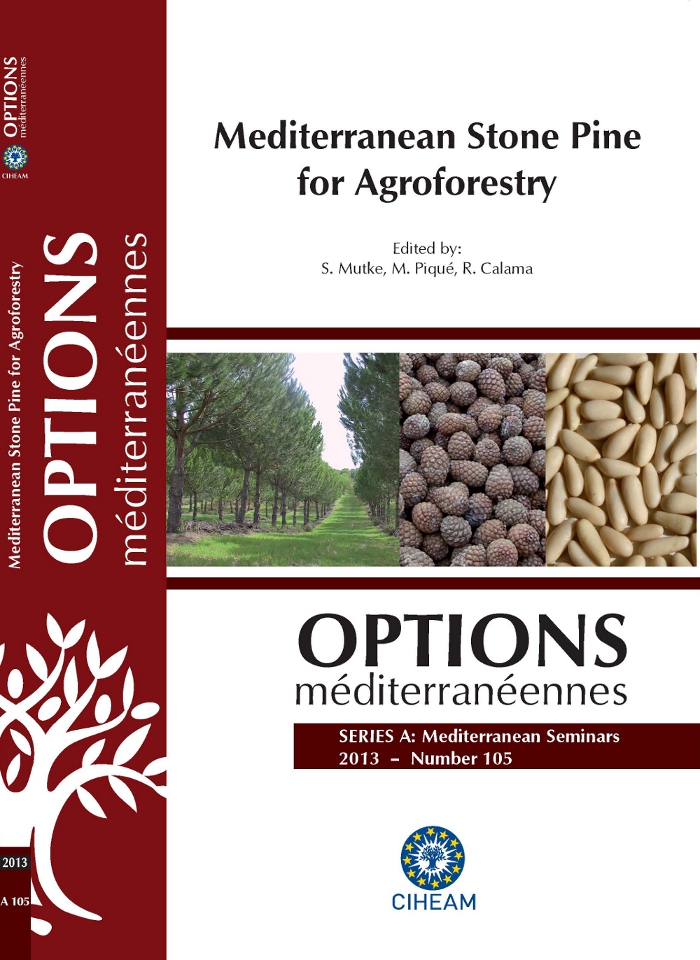| Article précédent | p. 73-79 | Article suivant |
Low genetic and high environmental diversity at adaptive traits in Pinus pinea from provenance tests in France and Spain
Mediterranean Stone pine (Pinus pinea L.) is a native species of the Mediterranean region, widely used for reforestation. It is characterised by a low genetic variation both at phenotypic traits and molecular markers. In the early nineties, experimental plots were established in several countries bordering the Mediterranean Sea for studying the distribution of genetic variability among provenances in adaptative traits as survival, vegetative and reproductive phase change, phenology and growth. Here we report results of the first decade at seven trial sites in France and Spain. The survival, ontogeny and growth patterns were homogeneous among provenances but differed among sites. On the other hand, the phenotypic plasticity of the species and its sensitivity to microsite (soil) variation produced strong spatial autocorrelations of the response variables, both between and within sites, which masked greatly the variation between provenances. Nearest-neighbours adjustments that captured the spatial pattern at each site reduced the error term and increased the significance of the geographic genetic variation considerably. Comparison of the adjusted average heights of each provenance showed a common trend between sites, with a lightly more vigorous growth in plants from colder or inland provenances. These results confirm the conclusions obtained in earlier analyses of the Spanish test sites, where these provenances showed also an earlier spring shoot phenology and a stronger tendency to polycyclism.
Le pin pignon (Pinus pinea L.) est un arbre forestier endémique du bassin méditerranéen, largement utilisé en reboisement. Il se caractérise par une faible diversité génétique de ses caractères morphologiques et une faible variabilité génétique au niveau des marqueurs moléculaires. Au début des années 1990, plusieurs tests de provenance ont été installés conjointement dans plusieurs pays méditerranéens pour évaluer la structure de la diversité génétique de caractères importants pour l'adaptation : survie, changements ontologiques entre les phases végétatives et reproductives, phénologie et croissance. Dans cet article, nous présentons les résultats d'analyses de la variabilité de ces caractères à l'issue d'une décennie de croissance dans 7 des tests de provenance installés en France et en Espagne. Les différentes provenances ne montrent pas de différences significatives pour la survie, ni pour l'ontogénie de la croissance, alors que les différences sont fortes entre sites. Les génotypes montrent une forte plasticité phénotypique en réponse aux variations de sol entre différents sites et à l'intérieur des sites, qui masque la variabilité entre provenances. Les ajustements aux plus proches voisins qui permettent de prendre en compte les effets spatiaux à l'intérieur des sites ont permis de mettre en évidence une diversité génétique significative entre provenances. La comparaison des moyennes de provenance ajustées montre une croissance plus vigoureuse des provenances issues des sites les plus froids et les plus intérieurs. Ces résultats confirment des résultats plus anciens issus des seuls tests de provenance espagnols, dans lesquels ces provenances montraient un débourrement printanier plus précoce et une tendance plus marquée au polycyclisme.
- [ Afficher ]
- [ Télécharger ]
- [ Exporter la citation ]
Vous pouvez télécharger la citation au format :
- [ Imprimer ]
-
Mots-clés
ADAPTABILITE, AGROFORESTERIE, ANALYSE COMPARATIVE, ESPAGNE, ESSAI DE PROVENANCES, FRANCE, PHENOTYPE, PINUS PINEA, PLANTATION FORESTIERE, VARIATION GENETIQUECiter cet article
Mutke S., Gordo J., Khouja M.L., Fady B. Low genetic and high environmental diversity at adaptive traits in Pinus pinea from provenance tests in France and Spain. In : Mutke S. (ed.), Piqué M. (ed.), Calama R. (ed.). Mediterranean stone pine for agroforestry. Zaragoza : CIHEAM / FAO / INIA / IRTA / CESEFOR / CTFC, 2013. p. 73-79. (Options Méditerranéennes : Série A. Séminaires Méditerranéens; n. 105). AGROPINE 2011 International Meeting on Mediterranean Stone Pine for Agroforestery, 2011/11/17-19, Valladolid (Spain). http://om.ciheam.org/om/pdf/a105/00006784.pdf



